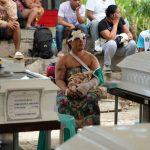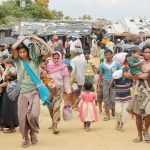
Rohingya urge UN to stop the killings in Myanmar
Rohingya representatives called on the international community on Tuesday to stop killings and discrimination in Myanmar, speaking at the first high-level United Nations meeting devoted to their plight.
“This is a historic occasion for Myanmar, but this is long overdue,” said Wai Wai Nu, founder of the Women’s Peace Network-Myanmar. She told envoys in the General Assembly Hall that minorities had endured decades of displacement and violence without action despite being recognized as victims of genocide. “That cycle must end today,” she added.
Myanmar, a Buddhist-majority country, has long denied Rohingya citizenship, classifying them as “Bengalis” from Bangladesh even though their families have lived there for generations. A 1982 law left nearly all stateless, says the Washington Post.
In 2017, attacks by a Rohingya insurgent group prompted a sweeping military crackdown that forced about 740,000 people into Bangladesh. Survivors and rights groups accused the army of killings, rape and arson. The United States in 2022 concluded the military committed genocide and crimes against humanity.
Since the military seized power in 2021, fighting has spread nationwide, including in Rakhine state where many Rohingya remain confined to camps.
UN refugee chief Filippo Grandi said Bangladesh is hosting nearly 1.2 million Rohingya. Renewed clashes this year between the Myanmar military and the Arakan Army have displaced another 150,000. Though the Arakan Army now controls most of Rakhine, he said the Rohingya still face severe restrictions. “They are subjected to forced labor and forced recruitment. Their lives are defined every day by racism and fear,” he told the meeting.
UN envoy Julie Bishop said there was little sign of political progress. “There is no agreed ceasefire, no pathway to peace, no political solution,” she said.
Myanmar’s military government plans elections in December, but UN rights chief Volker Turk said the vote would not reflect the will of the people. Rohingya remain disenfranchised, and ethnic Rakhine parties have been barred from running.
Civil society leaders pressed for stronger measures. “Despite decades of persecution, our deepest wish is to live in our ancestral homeland, Myanmar, in peace and security,” said Rofik Huson of the Arakan Youth Peace Network, calling for a UN-supervised safe zone.
Maung Sawyeddollah of the Rohingya Student Network added: “The UN must mobilize resources to empower Rohingya.”
General Assembly President Annalena Baerbock closed the session by saying: “Today is just a starting point, we have to do more.”






